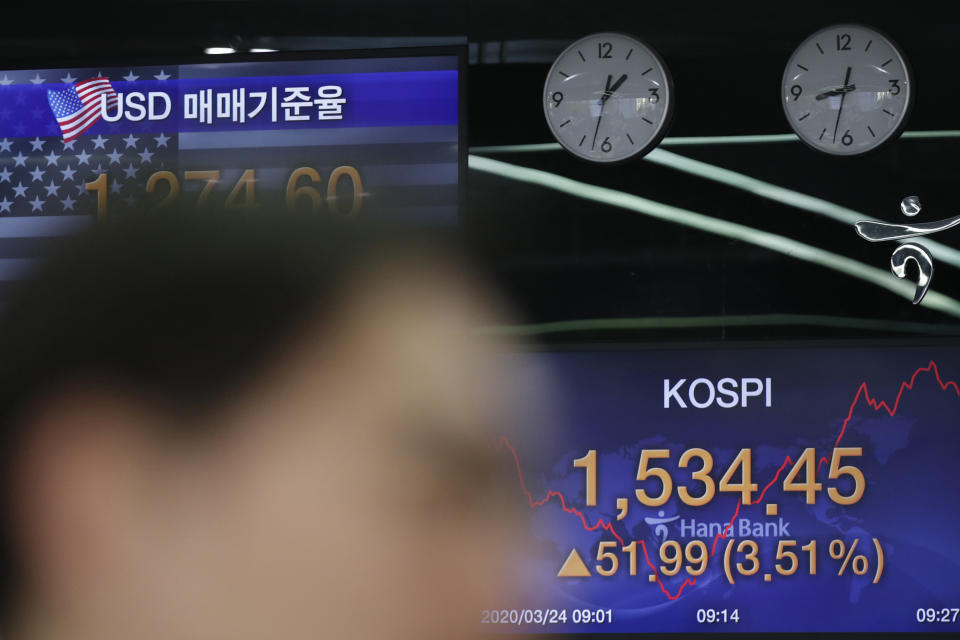Fidelity: Markets will react to coronavirus pandemic in three stages

The market reaction to the coronavirus pandemic will come in three distinct phases — escalation, consolidation, and recovery — according to a 30-year veteran of fund management.
“It is important is to understand the resilience of companies to the current challenge, and their long-term franchise value, in order to take advantage of opportunities,” said Jeremy Podger, the global special situations fund manager at Fidelity International, on Wednesday.
March was a dire month for financial markets: European stocks suffered some of their worst one-day losses ever, while US stocks see-sawed from their steepest losses since 1987 to their best three days since 1933.
Oil prices crashed, government bond yields fluctuated wildly, and central banks unveiled unprecedented stimulus measures in order to curb the economic effects of the pandemic.
“Assuming there is a reasonable degree of success in suppressing the virus, the question is what happens next and what measures will be taken to ensure that the epidemic does not break out again,” said Podger.
“At this point I am thinking of this as evolving in three phases: escalation, consolidation and recovery.”
Read more: World Bank warns of economic pain and poverty for Asia
Escalation
In the escalation phase, which Podger said is already upon us, the “ghastly news” of the virus “produces an extraordinary amount of noise and wild share price movements.”
But Podger, who has had a career spanning over 30 years in the financial sector, said that shares in many companies “have gone down more than their fundamental outlook would warrant.”
Many companies are “resilient” to the current challenges and there are thus investment opportunities, he said.
“In any case the massive dislocation we are seeing inevitably throws up opportunities and we find we have been more active in the past three weeks than in most previous months and have added several new names to the funds,” Podger said.
Consolidation
During the consolidation phase, the virus appears to be contained, Podger said, but restrictive measures will still be in place to keep it that way.
This is when medical advancements will mean that people are better treated and potentially even more resistant to infection, he said.
“In this phase we will get a much clearer idea of who will bear the costs, how much bad debt will be recognised and how much long-term damage has been done to the economy.”
“It is clearly of massive importance that jobs are retained through the escalation phase so that consolidation afterwards does not become a slump,” Podger said.
Read more: UK economic growth flatlined even before coronavirus hit country
Recovery
“The final phase of the coronavirus saga should then be recovery, likely marked by decisive medical prevention of further spread and a full return to normal social interaction,” Podger said.
The recover is “unlikely to go in a straight line,” because markets, anticipating an improvement, will be jolted by revelations of unexpected bad debt that had been hidden during the crisis.
It’s also possible that there will be an element of “payback” for the unprecedented fiscal stimulus measures introduced by governments, Podger noted.
Podger suggested that investors should expect a rise in tax rates, including in the US.
The fund manager said that Fidelity had reduced its exposure to financial companies, including banks and insurance companies.
It has also pulled away from firms in the transport and energy sectors, since it does not expect a meaningful near-term recovery in oil prices.
“In contrast, we have added to companies that are clearly going to be most resilient and those that should see a near full recovery after the current downturn,” said Podger.
“With the huge volatility we’ve seen, we have added new names in areas like staples and healthcare, as well as increasing our e-commerce exposure.”
Watch the latest videos from Yahoo UK

 Yahoo Finance
Yahoo Finance 
